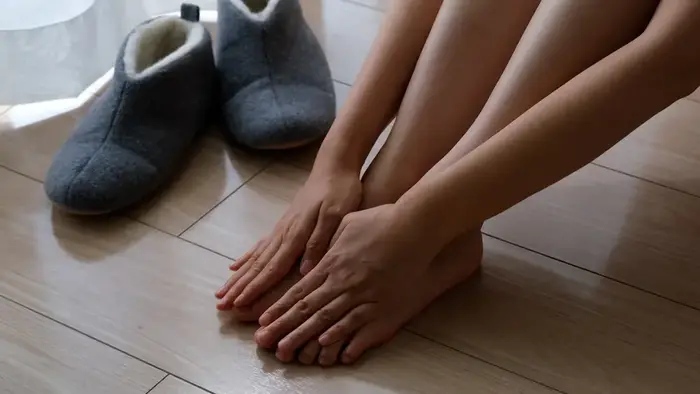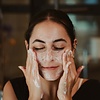How winter can affect your skin and what to do about it

The biggest factor in winter skin problems is simple: winter weather is drying. Moisture struggles to stay in cold air and when that cold air meets with skin, it wicks away that moisture as well. Even when you are warm and cozy inside, furnaces and fireplaces dry out the air in your home. For this reason, most people lucky enough to live in colder regions are going to experience dryness. Dry skin is a common problem that's caused by multiple factors. Everything from the aging to bathing too often to harsh winter weather can cause dry skin, but there are some simple things that you can do to prevent moisture from leaving your skin and even add more back. Choices like changing your soap or adding a humidifier to your bedroom could improve the condition of your skin. For some, simply applying a good quality natural moisturizer like our Regenerating Turmeric Face Moisturiser is enough to combat the problem.
However, for those who are already experiencing skin problems, the winter months can be a full-out nightmare. Skin conditions such as acne, psoriasis, and rosacea can be exacerbated by winter weather, but with a few adjustments to routine and treatment plans, these added symptoms may be avoided.
Acne
Acne is most commonly associated with oily skin. True, the cause of acne is a clog in the sebaceous (oil) glands. However, dry skin can lead to a clog as well. Dry skin means more dead skin cells to clog the sebaceous glands. To solve this problem, regular cleansing and moisturizing are key. Use simple, gentle cream cleansers that don't contain too many active ingredients. There is a time and place for acne-fighting ingredients, but it may be best to avoid them while dryness is present. After you have cleansed your face of all those nasty dead cells, use a non-comedogenic (non-pore clogging) moisturizer. This routine can be repeated once or twice daily until the skin has returned to its former moisturized glory. With dryness out of the way, you can go back to treating your acne with active ingredients like benzoyl peroxide or natural alternatives with or without salicylic acid, but just remember to introduce them slowly. Although benzoyl peroxide-based products are probably a better choice for some people suffering from acne, it really depends on the type of acne you're suffering from, and studies continue to advance and change the mind of some dermatologists. At Brewing Beauty Co, we do not have any products that contain benzoyl peroxide because we are a 100% natural cosmetics company. Instead, our products contain natural acne-fighting ingredients like white willow, noni fruit, and tea tree oil. These natural alternatives have also proven to be effective in fighting acne problems. Many of our customers are very pleased with the results they are getting with their acne problems using our formulas with these natural alternative ingredients.
Psoriasis
Psoriasis is a skin condition caused by the overproduction of skin cells which causes scaly patches, or plaques. The condition is extremely common and can frequently be seen on the scalp and joints. While there is no cure, there are various effective treatments, including the use of UVB rays to slow the growth of these overactive skin cells. For this reason, sufferers of psoriasis may notice their condition worsening during the winter due to the lack of sunlight. In addition, that annoying dryness in the winter air can cause the plaques to become more painful, or even become infected. Those who have mild symptoms of psoriasis during the summer may benefit from some minor changes to routine during the winter months. Some of these may include avoiding heavy winter clothing that can agitate skin, using humidifiers at home, or talking to a doctor about UVB therapy.
Rosacea
Rosacea is a skin condition that is characterized by redness on the skin, like a heavy blush, and visible blood vessels. The cause of this condition is unknown but knowing the triggers of rosacea can help keep symptoms under control. Sun exposure and heavy exercise can increase rosacea symptoms, but that doesn't mean that you are safe during the winter months. Cold and, you guessed it, dryness, are the most common triggers of the condition. Like other skin conditions discussed, avoiding harsh products and over-washing can help reduce the redness and bumps. With rosacea, the key is what products are being used. Stay away from washes and moisturizers that contain fragrances and high levels of alcohol. Our Calibrate collection products are formulated for sensitive skin and do not contain any fragrances or essential oils. Once harmful products have been limited, the biggest benefits for rosacea may come from prescriptions and treatment plans formulated with a dermatologist.
The winter months can be hard enough with gray skies, slippery road conditions, and bitter cold down to your bones. Throw on the effects that cold weather can have on existing skin conditions and winter can be downright miserable for many. However, take the time to observe the changes in your skin over time, be conscious of the products you use, and don't forget to talk to your doctor when things feel out of your control. Before you know it, the bitter dryness of winter will be over and you will be ready to tackle the skin problems of summer.








